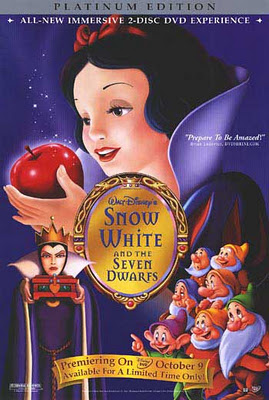This is a guest review by Rebecca Cohen.
Well, yes and no. Snow White is still of interest to feminist media critics for several reasons, not the least of which is the continued prominence of the main character in contemporary popular culture. In fact, Snow White’s image is almost as iconic as that of the Mouse himself in identifying the Disney brand. She is commonly featured in the hugely popular Disney Princess line of products aimed at young girls. There is no question that little girls today are still feeling the influence of Walt’s 1937 vision of feminine purity.
And the film has exercised a less overt influence as well. As the first feature-length animated feature to come out of the Disney studio, Snow White and the Seven Dwarfs established a formula for the Disney “princess movie,” as well as template for Disney storytelling which persisted for decades, and from which in many ways the studio is still trying to break free.
At the core of Snow White and the Seven Dwarfs are deeply conservative, specifically American values. Although “Snow White” is a German tale, and the setting of the movie is a vaguely medieval, vaguely European fantasy world, the heroine herself is decidedly American. The Wicked Queen isn’t exactly English, but her pronunciation is nevertheless distinctly aristocratic (Mid-Atlantic, perhaps?). Yet the sweet little princess sounds fresh out of Iowa – if a voice can possibly sound corn-fed, hers does.
At every turn, Snow White embodies old-fashioned, small town American ideals. She helps a baby bird not just back to its nest, but back to its “momma and poppa” (because every creature should properly be part of a traditional nuclear family, of course). When she arrives at the dwarfs’ cottage in the woods, her first instinct is to clean up. She assumes, in keeping with traditional gender roles, that the children who live there must not have a mother. That’s the only possible way to explain how their house could be so dirty. Not only does she clean up the place, she enlists the help of the woodland fauna. Indeed, Snow White domesticates everyone and everything around her, spreading the conservative ideals of cleanliness, hard work, and unquestioning acceptance of the status quo even to the animals. She civilizes the dwarfs as well, refusing to feed them until they’ve washed up.
Snow White quickly takes on all the tasks of a wife/mother, cooking and cleaning, staying home and baking pies (as all-American as you can get!), while the little men go off to work during the day. She transforms their cottage in the woods into an idealized suburban American household.
Although Snow White is happy to civilize and suburbanize the dwarfs, it’s clear that she longs for a stable heterosexual union with one man. Yet she remains perpetually passive and never takes steps to achieve that. She expresses what she wants through the song “Some Day My Prince Will Come,” but of course even that is phrased passively; he will come to her, someday. She’ll just have to wait. Although, as princess, she has a rightful claim to the throne, she betrays no shred of ambition in that direction. In fact, the only active step she ever takes in trying to bring about her own happy ending is to make a wish upon the Witch’s “wishing apple.” And look where that gets her!
Standing in contrast to Snow herself is her nemesis, the formidable Wicked Queen. The Queen embodies all the problems supposedly inherent when women occupy positions of power. She is vain and jealous, prioritizing insecurity about her looks above all other concerns. Surely she has a kingdom to run? Yet we never see her do anything except plot to kill her stepdaughter. The Queen’s imposing beauty is directly contrasted to Snow White’s childish innocence. The Queen is commanding, sophisticated, worldly – in short, dangerous.
The Queen is even something of an intellectual. When she disguises herself as a crone, she does so in a laboratory-like dungeon replete with test tubes, flasks and burners, not to mention shelves lined with books. She’s certainly the only character in the film ever seen reading a book. And her final attempt to kill the dwarfs involves use of a lever device, with which she tries to dislodge a boulder and crush them. But her resourcefulness and application of basic physics are to no avail. It’s no coincidence that her cleverness is foiled by a lightning bolt, a stroke of random luck. This anti-intellectualism is of a piece with the conservative American values suffused throughout the film.
Although Snow White’s passivity is evident, it’s notable that the only really effectual character, the Prince, is barely a character at all. He appears in two scenes and has maybe three speaking lines. In truth, he barely participates in the story, except to sweep in at the very end and wake the princess, after all the story action has already transpired. The movie isn’t at all about him or his ability to affect events. The dwarfs play a more prominent role and are constantly active, but they are essentially children – well meaning but utterly ineffective. It’s neither their agency nor their competence that wins the day. Rather it’s their essential goodness and perhaps more important, simplicity.
In the end, neither Snow White nor the Dwarfs ever question the feudalistic system that could allow an evil and dangerously shallow monarch to wield so much power over their lives. They simply live their lives by traditional values, and providence rids them of the unnaturally empowered female, replacing her with a wholesome heterosexual couple. This outcome is where Snow White and the Seven Dwarfs is at its most fundamentally conservative. Through kindness, humility and the observance of traditional gender roles, our heroes ultimately triumph over evil, without ever having to question the system that let evil get the upper hand in the first place.

